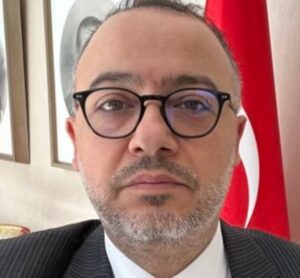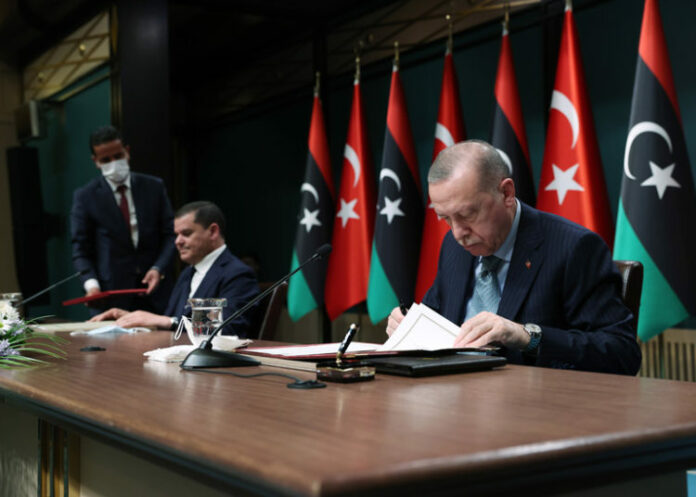Abdul Hamid al-Dbeibeh, prime minister of Libya under the Government of National Unity, met Turkish President Recep Tayyip Erdogan in April 2021 in Ankara.
Levent Kenez/Stockholm
Turkish-Libyan agreements, including a recent military cooperation framework signed by Turkey and Libya’s Government of National Unity (GNU), face substantial hurdles due to Libya’s fragmented political structure and the lack of parliamentary ratification.
During the Turkish parliamentary Foreign Affairs Committee meeting on November 14, 2024, Mehmet Fazıl Şekerci, head of the Libya Desk at Turkey’s Ministry of Foreign Affairs, highlighted that although the GNU had signed several cooperation agreements with Turkey, Libya’s parliamentary body has consistently withheld its endorsement. A key agreement signed in 2022 regarding hydrocarbon exploration and extraction faced immediate opposition from Libya’s judiciary, with a local court issuing a suspension on its implementation due to procedural challenges initiated by civilian lawyers.
Şekerci further explained that Libya’s internal legal structure allows the executive government to approve certain international agreements unilaterally. However, the parliament in eastern Libya disputes the GNU’s authority, arguing that significant agreements, especially those impacting national resources, must undergo parliamentary scrutiny. In response, Turkey has been engaging in discussions with Libya’s officials to address these legal concerns, yet judicial obstacles indicate that implementing such agreements without a unified Libyan government will remain challenging.
Utku Çakırözer, an MP of the main opposition Republican People’s Party (CHP), shared insights from previous discussions with Libyan parliamentary representatives who visited Ankara, noting that Libyan lawmakers questioned the GNU’s authority to bypass parliamentary review. Çakırözer reported that Libyan legislators emphasized that agreements like the hydrocarbon memorandum, lacking parliamentary endorsement, would be legally questionable under Libyan law. He stated, “Our Libyan counterparts were clear that without parliamentary ratification, these agreements would lack enforceability under Libyan law, raising serious concerns about their legitimacy.”
Minutes from the parliamentary committee meeting where agreements with Libya were discussed, focusing on their legal challenges and political implications.
Disisleri-Komisyon-toplanti-14-KasimTurkish Deputy Foreign Minister Nuh Yılmaz, who transferred from the Turkish Intelligence Agency (MİT) along with Foreign Minister Hakan Fidan, also addressed the legal complexities facing the Turkish presence in Libya. Yılmaz underscored that Turkey is committed to respecting Libyan sovereignty, yet it faces limitations due to Libya’s fragmented governance. He explained that while Turkey recognizes the GNU as the legitimate government, the agreement’s implementation hinges on resolving Libya’s domestic power struggles. Yılmaz also emphasized that the agreements with Libya are intended to respect both international norms and Libyan internal law, stating, “We are prepared to support stability in Libya, but this necessitates an alignment with Libya’s legal requirements.”

The military agreement approved at the parliamentary committee meeting underscores the deepening military cooperation between the two countries, granting Turkish forces broad legal protections and logistical support while operating on Libyan soil.
The memorandum, signed on March 1 in Antalya, builds upon previous understandings, including the Military Training Cooperation Memorandum signed in 2012 and the Security and Military Cooperation Memorandum signed in 2019. Turkey will support the restructuring and training of Libya’s armed forces and security forces. This initiative responds directly to Libya’s request for assistance, aiming to enhance the country’s defense capabilities. One of the most noteworthy aspects of the memorandum of understanding (MOU) is the broad legal immunity it provides to Turkish forces operating in Libya.
The debate over the legal status of the recent maritime agreement signed between Turkey and Libya is not new. At a parliamentary committee meeting on November 8, 2022, former Turkish Foreign Minister Mevlüt Çavuşoğlu clarified that the 2019 maritime agreement, which sparked regional controversy, is technically an MOU, rather than a formal international treaty. Çavuşoğlu explained that Libya’s interim government, established under UN guidelines, lacks the authority to ratify international agreements, but can enter into memorandum agreements, a distinction he emphasized to the attending deputies.
The minister highlighted that Turkey’s own parliament ratified the 2019 memorandum to establish an economic zone in the Mediterranean, aligning with Turkey’s strategic interests in the area. He also remarked that Turkey’s legislative body routinely approves similar MOUs with foreign nations, underscoring that this form of agreement is standard practice within Turkish foreign policy, despite the MOU’s limited binding power on the Libyan side.
Turkey’s strong ties with the Libyan government have been accompanied by a steady increase in its military footprint in Libya. In late 2023, Turkey’s parliament passed a presidential motion extending the Turkish military mission in Libya for an additional 24 months. President Erdoğan emphasized the strategic significance of the Turkish navy’s presence in the Mediterranean, stating that the extension serves to protect national security and address potential risks, including migration pressures and terrorism threats.
Since 2011, Turkey has played an active role in supporting factions allied with the Libyan government through arms, training and military aid, with significant financial assistance from Qatar. Turkey has also deployed Syrian fighters as mercenaries in Libya, providing them with monthly wages and, reportedly, promises of Turkish citizenship for themselves and their families. These fighters, carefully selected by Turkey’s intelligence agency, MIT, have been part of Turkey’s broader regional strategies, dating back to MIT’s collaboration with anti-Assad factions in Syria.
Libya-pdfTurkey’s support was instrumental in bolstering the UN-backed Government of National Accord (GNA) in its military campaign against forces led by Khalifa Haftar. This support included weapons, ammunition, drones and the mobilization of Syrian fighters to counter Haftar’s attempts to capture Tripoli. Turkey’s Bayraktar TB2 drones, produced by Baykar Makina under the leadership of Erdoğan’s son-in-law, Selçuk Bayraktar, proved pivotal in shifting the balance, helping the GNA to halt Haftar’s advance.
Beyond military involvement, Turkey has expressed a clear economic interest in Libya’s oil and gas reserves. During a press conference with then-Prime Minister Fayez al-Sarraj in Ankara on June 4, 2020, Erdoğan announced plans to broaden cooperation to include exploration and drilling for natural resources within Libyan territories. In November 2020, Turkey and the GNA formalized a military cooperation agreement along with a maritime demarcation deal. While the maritime agreement claimed to establish exclusive economic zones between Turkey and Libya, it has faced widespread rejection from other Mediterranean nations. The security agreement also permits Turkey to maintain a direct military presence in Libya.
According to a report presented to the UN Security Council on May 24, 2022, UN investigators found that Turkey had violated UN sanctions by providing combat training, military supplies and logistical support to various Libyan factions. The report noted that while certain forms of training — such as ordnance disposal — might be exempt as humanitarian support, most of Turkey’s activities, including combat and special forces training, contravened UN Resolution 1970 (2011), which prohibits the transfer of military support to armed groups in Libya.




